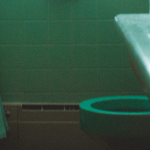She doesn’t save him this time. In the woods, she had known which mushrooms they could eat. In the House, she had shown him the trick with the chicken bone. When things got bad that one year, she had paid for his stint in the clinic, and when he’d needed a place to stay for a while, she’d made a bed on the couch every night. Her therapist tells her now she did all she could and more, that try as she might, there are simply some things that are out of her control. She tells her she needs to forgive herself. She does not.
She insists on being a pallbearer. She tells her husband she would dig the damn grave herself if they would let her, that what she’d like more than anything is to do the whole funeral alone. The coffin, when they lift it, feels barely lighter than cardboard. As they walk down the aisle, she remembers all the questions she used to ask when they got together: Did you eat today? What did you eat? Can I make you something? How about this? She remembers the one Thanksgiving when he laughed at her and wriggled his fingers. “I’ll fatten you up!” he cackled. She had stopped asking questions after that.
Their father attends the funeral, or mostly does. He staggers into the church in the middle of one of the readings and stands swaying by the hole while the coffin is cranked in. On their way back to the cars, he catches up to her and holds her tight. Never! he sobs against her. I’ll never let you go from me again! He tells her that he will come home with them, that he’ll help with the housework, the kids. We’ll be a family again, he promises. Like we should have been all this time. It takes almost nothing for her husband to convince him to be bought a few drinks instead. The two men walk up the street together, and her father doesn’t even look back. (What a shock.)
Her sister-in-law has taken the children for the night. When she arrives back home, she is alone in a way she hasn’t been in years. Alone as she has never been, she realizes, walking upstairs. Even in the woods and in the House and in the after, she had always, always, had him.
She lays on the bed and hugs her pillow to her chest. The two of you are selfish! their stepmother said, often. You take and take, and what is left for us! We need food as much as you do! More! Can’t you think of someone besides your greedy, needy selves? Her therapist has been trying for years to convince her this wasn’t true, but she wasn’t in the House when the two of them were kids, and she wasn’t in the apartment four days ago when she found him. She doesn’t know that this had been her first thought when she smelled the gas—not What will I do if my brother is dead but What will I do if my brother is dead. Who was she going to call when she woke up in the middle of the night? Who else could she always count on to be awake at those odd hours too? Who was she going to text when it all came back out of nowhere, when she singed her hair with her curling iron and had that scent in her nose all day; when her son, so bright and generous, offered her a piece of his candy; when with two hands she pushed her daughter on the swing and thought, Like this. I did it just like this.
She rolls over to stare out the window, at the branches swaying gently on the trees in her backyard. On her nightstand is the monitor that hears her daughter’s breath and cries, and next to it is the lumpy bowl her son made for her birthday. On the wall by the window is a set of wedding photos, her in her dress and her husband in his tux and the cake and the rings and a toast. To happy endings, his best man said, and all of their guests had cheered.
She curls around the pillow. Even when they were abandoned (for the second time) and even when they realized what the woman in the House had wanted, she had not screamed and she had not cried. She does both now. For the sake of the neighbors she buries it in the pillow, but she pours everything she is feeling into a wail like she’s burning a live. It still feels selfish, to cry for herself, but for the first time in her life, she finds she can do it anyway. She wants to.
Because who in this happy ending is she going to talk to now? Who among all these people will ever understand like he did: That in truth all this happiness hasn’t put an end to anything. That there are times when all she wants in this world is to be wandering back in those woods, to have the birds already behind her, devouring her way home, to be lost in the dark so deeply that she will never ever be found.
…
Biography
Derek Heckman was born in Peoria, Illinois, and holds an MFA in Fiction from the University of Montana. His stories have been published in The Collapsar, The Furious Gazelle, and Wigleaf. The start of his novel “A Beginner’s Guide to Coming Back from the Dead” was featured in Embark Journal. He currently lives in Boston, Massachusetts. You can find him on Twitter as @herekdeckman.
Image: unsplash.com





